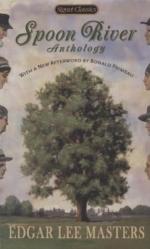|
This section contains 3,065 words (approx. 11 pages at 300 words per page) |

|
SOURCE: “The Johari Window: A Perspective on the Spoon River Anthology,” in Midamerica, Vol. 8, 1986, pp. 49-60.
In the following essay, Noe analyzes Spoon River in terms of the Johari theory of human communication.
“All my life I have endured loneliness; and now with all these changes come to pass I felt desolate enough,” wrote Edgar Lee Masters in Across Spoon River. “As a boy on the Masters farm the silence of the prairie had seemed to me to be the silence of my own heart.” (284).
Indeed, loneliness, alienation, and silence seem to be the enduring themes of this autobiography, as Masters complains that his parents never supported his literary endeavors, that his sister failed to live up to the ideal represented by Dorothy Wordsworth, and that his first wife was never truly his mate in any emotional, intellectual, or spiritual sense. Masters's life-long pursuit of woman after woman...
|
This section contains 3,065 words (approx. 11 pages at 300 words per page) |

|


